How many people have to die or be injured before we revise the drink driving limit?

For those of you who aren’t old enough to remember the 1960s, this was the decade that saw the world’s first female prime minister, Apollo 11 landing people on the moon, and the abolition of the death penalty.
It was also the decade that the UK introduced its drink driving limit of 80mg of alcohol in 100ml of blood – another cause for celebration at the time. However, since then, our drink driving limit has remained exactly the same, making it rather outdated by current standards. You might surmise that it hasn’t changed because it’s been a resounding success in reducing death and serious injury. But not so fast.
Alcohol remains one of the biggest killers on the road, it’s responsible for 13 per cent of all traffic deaths. About 240 people are killed every year due to drink driving, and this number has stayed roughly the same since 2010.
Serious injuries haven’t simply plateaued but increased by 10 per cent – with the latest annual data showing an increase from 1,360 to 1,500. Serious injuries include fractures, internal injuries, crushings, severe cuts, or injuries that cause death 30 or more days after the accident. These serious injuries tend to be ignored as they aren’t deaths, but have left thousands of people with life-changing injuries such as full-body paralysis, lifelong comas and severe brain damage.
A poll from the Alcohol Health Alliance UK found that the British public is in favour of a reduction in the drink driving limit, with 77 per cent supporting a reduction, while a study by First4Lawyers found that 70 per cent of people think motorists shouldn’t be allowed any alcohol before driving.
This begs the question: does anyone really know whether they’re under or over the limit? Alcohol affects people in different ways. One person could drink the same amount as another but when tested they could be on different sides of the limit. The fact that we allow knowingly impaired people to guess whether they’re under the limit and then operate the most dangerous piece of machinery they likely wield, seems odd, to put it mildly.
That’s why I believe it is time for change. As a first step, I’ve tabled an amendment to the Police, Crime, Sentencing and Courts Bill – currently being debated in the House of Lords – to reduce the drink driving limit from 80mg to 50mg/100ml in England and Wales.
This will match almost the entirety of Europe, as well as Scotland, which introduced this lower limit in 2014. Currently, England and Wales have one of the highest limits in the world, comparable to Venezuela.
Now some people will be quick to say that Scotland’s reduction hasn’t worked, citing research by the Universities of Bath and Essex that suggests the reduction has not led to fewer traffic collisions. However, the study authors concluded that this lack of impact was due to police enforcement being weak – such as no increase in random breath testing – and no improvement or increase in alternative transport: two issues that could be addressed in England and Wales.
There is a wealth of evidence that shows how a reduction could help reduce harm. A review by Nice found that drivers within England and Wales’ current limit, so 50-80mg, are six times more likely to be involved in a fatal accident compared to no alcohol at all. Reductions in the blood alcohol limit have been shown to reduce fatal collisions in Australia, France, Japan, Sweden, Switzerland and the USA.
As with many harm reduction policies, there is a clear economic benefit to reducing the limit. The Department of Transport estimated that the cost of personal injury accidents as a result of drink driving is £800 million a year, and that doesn’t even include the 10 per cent of accidents where drivers were impaired but within the limit. Finances aside, we have a chance here to save real lives and avoid the suffering of friends and families, by making quite a simple choice.
With such overwhelming public support and the potential to save both lives and money, what has the government got to lose? We’ve already blown our chance at being “world-leading” in this department, but it’s not too late to put our foot back on the gas – safely – and make a real difference.
Lord Clive Brook of Alverthorpe is a Labour member of the House of Lords
Read More
The Queen needs rest, but is there a way she can do that without breaking her oath?
The Budget will be a compromise between the PM and the chancellor | John Rentoul
Opinion: It’s absurd to take school funding from deprived areas after Covid
Letters: Jacob Rees-Mogg’s mask comments are an affront to us all
Maybe the real ‘festival of Brexit’ is the one we’re all living in
Sunak’s Budget will squeeze public spending – can he get away with it? | Andrew Grice

